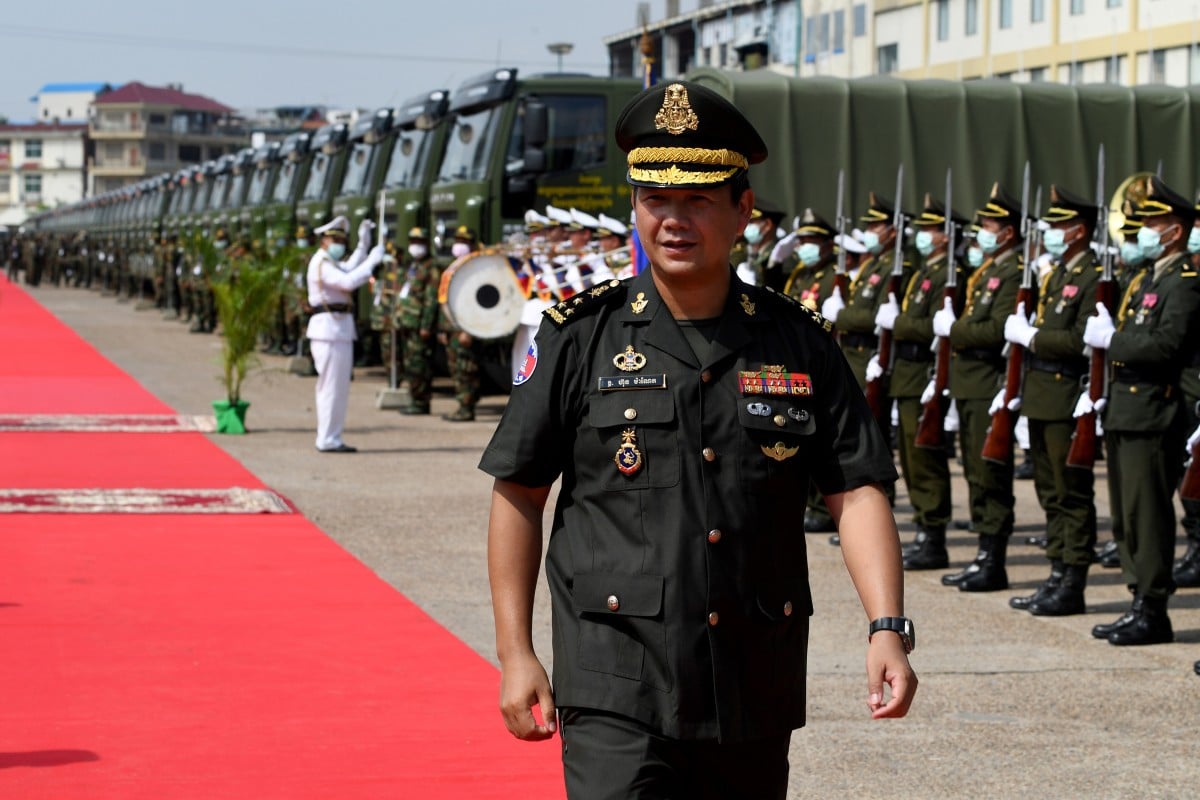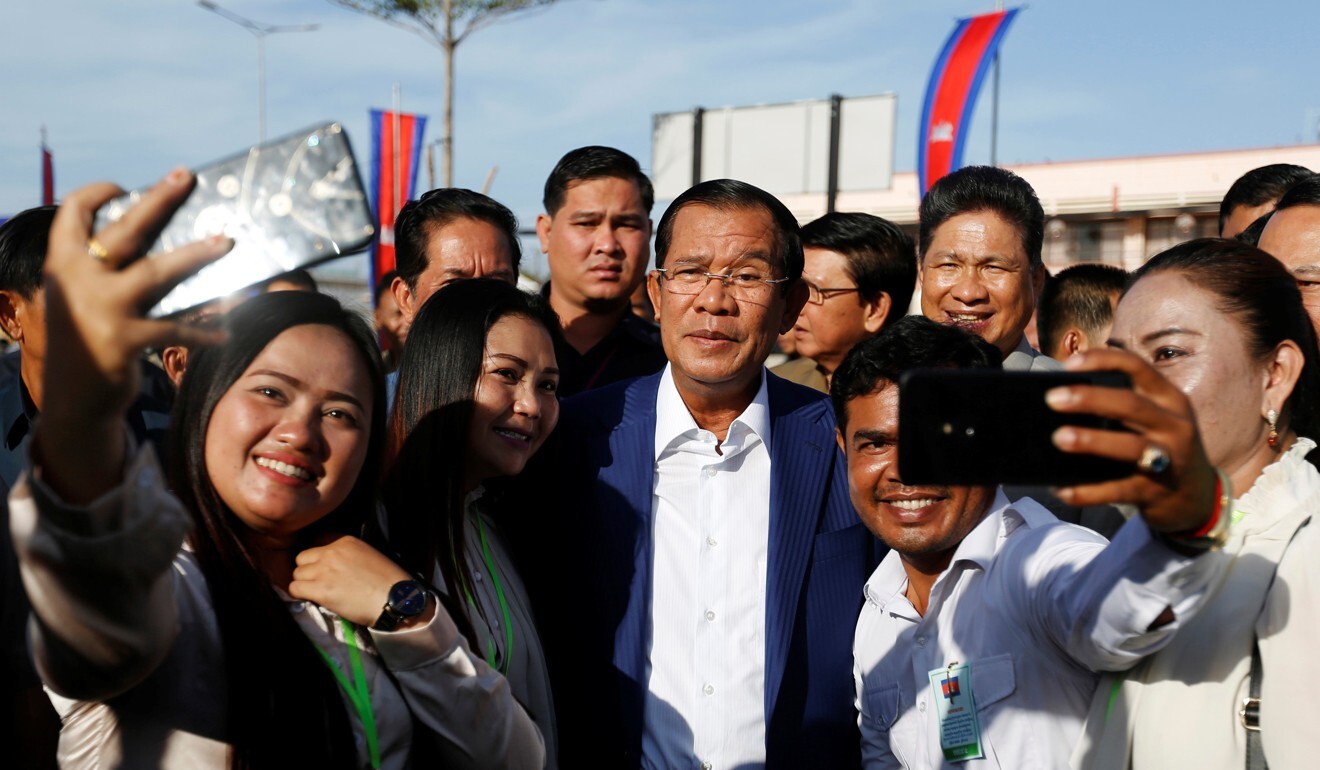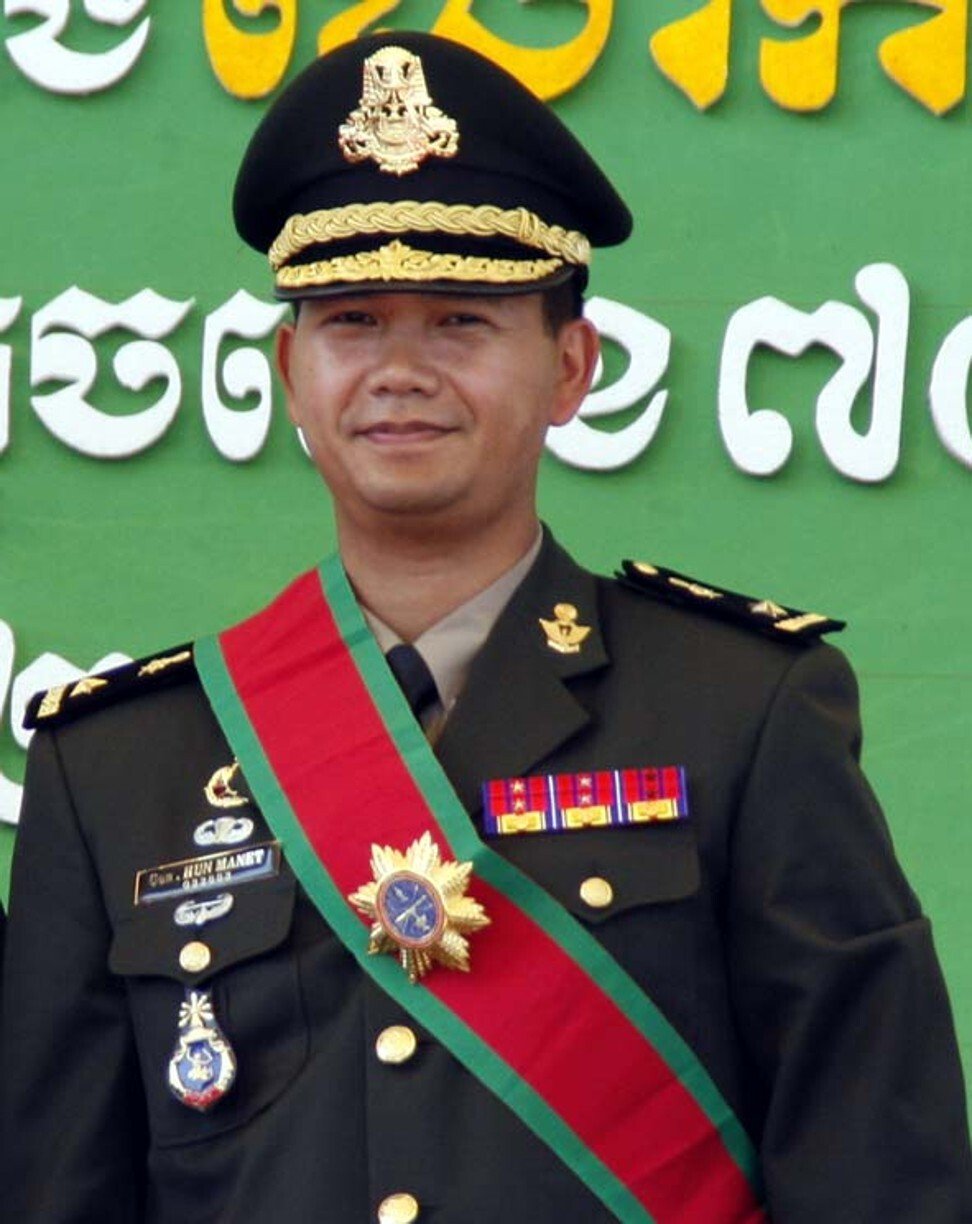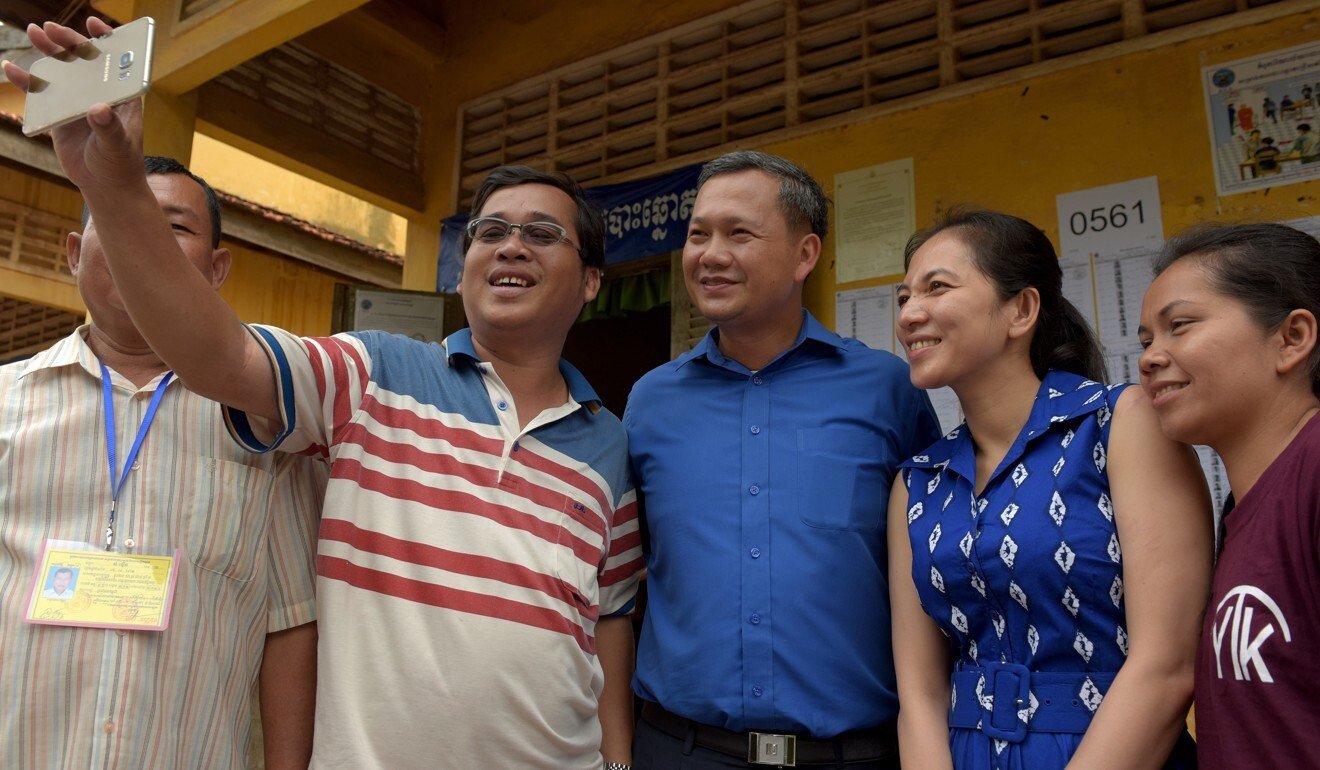Hun Manet, the eldest son of Prime Minister Hun Sen, is widely tipped to succeed his father
Educated at America’s Military Academy, he was seen as a potential ally for the US but since returning home he has rebuilt the military with China’s help
Danielle Keeton-Olsen
scmp
Published: 9:00am, 15 Aug, 2020

Hun Manet passes the honour guard during a ceremony in Phnom Penh to accept 290 Chinese military trucks. Photo: AFP
Danielle Keeton-Olsen
scmp
Published: 9:00am, 15 Aug, 2020

Hun Manet passes the honour guard during a ceremony in Phnom Penh to accept 290 Chinese military trucks. Photo: AFP
“He’s a deputy commander and hasn’t commanded a battalion in the field.”
When Cambodia’s long-serving Prime Minister Hun Sen visited Beijing in February, trailing behind him as he shook hands with Foreign Minister Wang Yi was his eldest son, Hun Manet.
To discerning eyes, the scene was evidence not only of Hun Sen’s strengthening ties with Beijing – the visit took place despite the widespread suspension of flights to China amid the first wave of coronavirus infections – but also of Manet’s ascendancy as his father’s preferred successor.
To discerning eyes, the scene was evidence not only of Hun Sen’s strengthening ties with Beijing – the visit took place despite the widespread suspension of flights to China amid the first wave of coronavirus infections – but also of Manet’s ascendancy as his father’s preferred successor.
While other countries have sanctioned Hun Sen’s government over alleged human rights issues, labour abuses and corruption, China’s relationship with Cambodia has been going from strength to strength. And with the United States and China locked in a growing struggle for influence in Southeast Asia, much energy is being expended in trying to discern which way this apparent leader in waiting will lean: towards the West or Beijing?

Supporters pose for a picture with Cambodia's Prime Minister Hun Sen in Phnom Penh. Photo: Reuters
LEADER IN WAITING
The sense that Manet is being primed for the top job increased in June when the three-star general was promoted from vice-president to president of the youth wing of the Cambodian People’s Party (CPP). The party has ruled Cambodia since 1979, and has cemented its grip on power since the Cambodia National Rescue Party (CNRP) was banned in 2017.
Before the 2018 election, Hun Sen, 68, had said Manet’s future depended on whether the party – and “the people” – would accept his second-born son (Hun Sen’s first son Hun Kamsot died soon after birth). Hun Sen had also said at the time he would lead the country for another 10 years.
Cambodia’s Hun Sen has ruled for 35 years – is he looking to shore up his dynasty?
14 Jan 2020
Despite Hun Sen’s apparent intentions, hurdles remain for both father and son. He is still fighting to stomp out remaining pockets of support for the CNRP amid economic uncertainty in the midst of the pandemic and social tremors arising from growing suppression of free expression and civil society.
Even so, observers see Manet’s ascent as increasingly inevitable after a decade of speculation.
“He was appointed to lead the CPP Youth because Hun Sen understood that in the future youth would play a very important role in leading Cambodia and he wanted to ensure that Cambodia was ready for future leaders,” said Sam Seun, a spokesperson for the Royal Academy of Cambodia.
If, as expected, Manet does one day take Hun Sen’s place as prime minister, his route to power will have been starkly different from that of his father.

Hun Manet, son of Cambodia's Prime Minister Hun Sen. Photo: SCMP Pictures
EARLY YEARS
Manet, 42, was born on October 20, 1977, two years after the murderous Khmer Rouge regime of Pol Pot came to power. Hun Sen had been a battalion commander with the Khmer Rouge but at about the time of Manet’s birth was displaced during an internal purge and fled with some of his cadres to Vietnam. Hun Sen then helped Vietnam to invade Cambodia in January 1979 and defeat the Khmer Rouge, which returned to being a guerilla fringe group as a new era of civil war began. Hun Sen was made deputy prime minister of the Vietnamese-installed government and took the top job in 1985 after the death of Chan Sy.
Allegations that the government was torturing thousands of political prisoners dogged the early years of Hun Sen’s premiership but he gained credit for his role in signing up to the 1991 Paris Peace Accords, which paved the way for United Nations peacekeeping operations and reopened the country to foreign investment. A UN-backed election two years later resulted in a hung parliament and Hun Sen was forced to govern alongside Prince Norodom Ranariddh.
At about the same time that Hun Sen was engineering a bloody coup to wrench the leadership away from his rival (succeeding in 1997), Manet was studying at the US Military Academy at West Point. In 1999, Manet became the prestigious academy’s first Cambodian graduate.

Graduates at the United States Military Academy at West Point, where Hun Manet was educated. Photo: AFP
After gaining a master’s degree in the US and then a doctorate in Britain, Manet returned to Cambodia in 2008. Soon after his return, his credentials as a potential leader were burnished by claims in the Thai media at the time that he played a key role in negotiations after Thai soldiers encroached on ancient temples in Preah Vihear province.
In 2008, the CPP won 90 of the 123 seats, having campaigned on the need for a strong military, and many observers credited the stand-off over the temples in Preah Vihear for boosting support for the party – and, by extension, for Manet.
However, Sebastian Strangio, a journalist and author who has documented Hun Sen’s rise and rule, said the extent of Manet’s role in the incident was questionable.
“I suspect that his role in the border incident was exaggerated considerably,” he said.
Whatever the truth of the incident, Manet shot up the ranks over the next few years, becoming a two-star general in 2011 and landing his third star in 2013.
Ahead of the 2018 national election, Manet was named deputy commander-in-chief of the armed forces and commander of the army, placing him at the helm of protecting his father during an election that was deemed a “setback to democracy” by US and other international observers because of the dissolution of the CNRP, the country’s main opposition. In 2018, the CPP won all 125 seats.

Hun Manet, son of Cambodian Prime Minister Hun Sen, and his wife Pich Chanmoy pose with voters after casting their ballots in the 2018 general election in Phnom Penh. Photo: AFP
But questions remain over Manet’s unusually swift career progression. Emeritus professor and military historian Carl Thayer said Manet had less military experience than others of his rank,
Thayer pointed to one of Manet’s earliest promotions, when he received the rank of colonel soon after his return to Cambodia in 2008.
“That’s a rank you get towards the end of your career because in most developed militaries, you have time and rank – you can’t get a promotion until you do the minimum time,” he said.
“He’s a deputy commander and hasn’t commanded a battalion in the field.”
However, Kin Phea, director general of the Royal Academy of Cambodia’s International Relations Institute, said Manet might have been rewarded for his work in streamlining and modernising the country’s armed forces.
“Once he assumed the army commander post, he proved himself as an army reformer by building the capacity of the army, equipping military facilities and promoting international military cooperation,” said Phea. “However, being the son of a prime minister is also a very important connection to his quickly rising military rank,” added Phea.
A PARTNER IN CHINA
One of Manet’s key partners in building the armed forces has been China, which in addition to supplying military hardware has been pouring investments into a China-Cambodia tax-free economic zone in Sihanoukville and funding development projects, including motorways and dams. Among these projects are coastal resorts the US fears could be part of a larger Chinese plan to base military assets in the country.
Thayer said that having reversed its position from funding the Khmer Rouge during the civil war to backing Hun Sen’s government, the economic powerhouse had since become so influential in Cambodian military circles that it was common for generals to learn Chinese.
Last year, Hun Sen said Cambodia’s army had purchased US$40 million of weapons from China.
More recently, when citizens questioned a purchase of nearly 300 military trucks from China during a pandemic that has pushed hundreds of thousands of low-income workers to the brink, Manet claimed the government had not used the national budget but relied on fundraising efforts initiated by his father. At the same time, he denied the trucks had been donated by China, though he said the country had been engaged in coronavirus relief efforts, sending medical experts and supplies.
As tensions between China and the US continue to mount, particularly over Beijing’s territorial claims in the South China Sea, Manet may find himself in a difficult position.
Given his US education, some experts have previously seen him as a potential ally for Washington, though author Strangio said few would describe Manet as “liberal”.
Instead, Strangio said Manet was likely to maintain the status quo, perhaps with more measured tactics.
“This might mean that Manet injects a more conciliatory tone into Cambodian politics; it might also mean that he lacks the requisite skill and ruthlessness to maintain a judicious power equilibrium within the CPP’s ranks,” Strangio said.
Phea added that while Manet had pledged to continue his father’s political legacy, he did not have the same political debts as Hun Sen had with other nations.
Both Strangio and Phea saw Manet’s ascent as likely, but cautioned that much could change before Hun Sen was ready to relinquish his leadership. Phea also questioned how strong Manet’s grip on power would be without his father’s presence, while Strangio warned that Manet might not be able to maintain the networks his father had established.
“With the presence of [Hun Sen], the succession and transition would be smooth and peaceful,” Phea said. “Without him in the party’s most powerful position, the succession and transition would be … difficult.”
“Governing effectively in this context involves winning the loyalties of hundreds of party power brokers, renewing them periodically through access to resources and rents, and demonstrating that he has the will and ability to see off the mounting challenges from without,” Strangio said. “And as the career of Prince Norodom Ranariddh showed, political ability is not necessarily heritable.” ■
Thayer pointed to one of Manet’s earliest promotions, when he received the rank of colonel soon after his return to Cambodia in 2008.
“That’s a rank you get towards the end of your career because in most developed militaries, you have time and rank – you can’t get a promotion until you do the minimum time,” he said.
“He’s a deputy commander and hasn’t commanded a battalion in the field.”
However, Kin Phea, director general of the Royal Academy of Cambodia’s International Relations Institute, said Manet might have been rewarded for his work in streamlining and modernising the country’s armed forces.
“Once he assumed the army commander post, he proved himself as an army reformer by building the capacity of the army, equipping military facilities and promoting international military cooperation,” said Phea. “However, being the son of a prime minister is also a very important connection to his quickly rising military rank,” added Phea.
A PARTNER IN CHINA
One of Manet’s key partners in building the armed forces has been China, which in addition to supplying military hardware has been pouring investments into a China-Cambodia tax-free economic zone in Sihanoukville and funding development projects, including motorways and dams. Among these projects are coastal resorts the US fears could be part of a larger Chinese plan to base military assets in the country.
Thayer said that having reversed its position from funding the Khmer Rouge during the civil war to backing Hun Sen’s government, the economic powerhouse had since become so influential in Cambodian military circles that it was common for generals to learn Chinese.
Last year, Hun Sen said Cambodia’s army had purchased US$40 million of weapons from China.
More recently, when citizens questioned a purchase of nearly 300 military trucks from China during a pandemic that has pushed hundreds of thousands of low-income workers to the brink, Manet claimed the government had not used the national budget but relied on fundraising efforts initiated by his father. At the same time, he denied the trucks had been donated by China, though he said the country had been engaged in coronavirus relief efforts, sending medical experts and supplies.
As tensions between China and the US continue to mount, particularly over Beijing’s territorial claims in the South China Sea, Manet may find himself in a difficult position.
Given his US education, some experts have previously seen him as a potential ally for Washington, though author Strangio said few would describe Manet as “liberal”.
Instead, Strangio said Manet was likely to maintain the status quo, perhaps with more measured tactics.
“This might mean that Manet injects a more conciliatory tone into Cambodian politics; it might also mean that he lacks the requisite skill and ruthlessness to maintain a judicious power equilibrium within the CPP’s ranks,” Strangio said.
Phea added that while Manet had pledged to continue his father’s political legacy, he did not have the same political debts as Hun Sen had with other nations.
Both Strangio and Phea saw Manet’s ascent as likely, but cautioned that much could change before Hun Sen was ready to relinquish his leadership. Phea also questioned how strong Manet’s grip on power would be without his father’s presence, while Strangio warned that Manet might not be able to maintain the networks his father had established.
“With the presence of [Hun Sen], the succession and transition would be smooth and peaceful,” Phea said. “Without him in the party’s most powerful position, the succession and transition would be … difficult.”
“Governing effectively in this context involves winning the loyalties of hundreds of party power brokers, renewing them periodically through access to resources and rents, and demonstrating that he has the will and ability to see off the mounting challenges from without,” Strangio said. “And as the career of Prince Norodom Ranariddh showed, political ability is not necessarily heritable.” ■

9 comments:
he knows how to shoot with his cannon and two balls.
He knows how to shoot with his cannon and a lot of young beautiful khmer girls are his victims.
His father is a dictator so he doesn't need to know how to shoot to become a 4-star general. In fact, a day after he was born, he's already a 4-star general. Even if he's a zero star general, all the real 4-star generals would still need to obey his commands.
Many Cambodians will celebrate non-stop 7 days and 7 nights the day after this dictator is dead.
When you have no foods to eat in the near future, you look at your picture with Ah Kbot cheat Hun Sen, your stomach will be full.
Such a stupid people !!
For the future of Cambodia he should never be allowed to succeed his father the dictator. When Hun Sen is gone, Hun Manet should also be gone.
Even Ah Chor Luoch Morn Hun Sen who has given in to all Yuon's demands in exchange for his stay in power wants to have a dynasty too.
Your dream of having a dynasty will end as soon as you go to hell in the foreseeable future.
The worst hell has granted Visa for Ah Kwak Hun Sen already. He will live with his boyfriends Sihanouk and Ho Chi Minh.
For centuries the evil Yuon wanted to swallow Cambodia.
In 1979, Yuon accomplished its goal of swallowing Cambodia by putting a crazy animal named Hun Sen to implement the Vietnamization of Cambodia policy and control Khmer people so that Vietnam could absorb Cambodia slowly but surely.
One of Yuon's tactics to control Khmer people was ordering Ah Chker Chkuot Hun Sen to create Law of Kdor Ah Hun Sen.
If Khmer people want to survive, they must fight to abolish the existing law of Kdor Ah Hun Sen and stop any new law of Kdor Ah Hun Sen.
You cannot let this crazy animal Hun Sen create law at will and then suppress people by using this newly created law.
1st step: STOP THE LAW OF KDOR AH HUN SEN.
2rd step: Whenever Ah Runteas Banh Hun Sen tries to create a new law aiming at oppressing Khmer people and political parties, make a nationwide peaceful protest against him to prevent his crazy ideas and Yuon's ambitious ideas to become LAW OF KDOR AH HUN SEN.
3nd step: we must work hard to bring the CNRP back in the electoral process so that we could have a chance to stop Yuon's ambition from swallowing Cambodia.
Notice that we have made progresses in the electoral process to a point that Ah Kwack and Yuon could not control the NEC and the outcome of the election any longer, which prompted them to dissolve the CNRP to avoid defeat in the 2018 election.
We must persevere in our noble struggle to free Cambodia from the evil Yuon that use its slave Hun Sen to facilitate its goal of making Cambodia a second Champa.
I wonder what would become of ah Manet if the cop Chinese communists party was to collapse?.it should make ah Manet very scared and frightened living daylight out off him.
Post a Comment